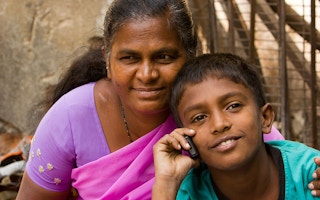Emerging economies in Asia should waste no time in taking advantage of digital technology to bring financial access to the region’s inhabitants who are currently excluded from the financial system.
To continue reading, subscribe to Eco‑Business.
There's something for everyone. We offer a range of subscription plans.
- Access our stories and receive our Insights Weekly newsletter with the free EB Member plan.
- Unlock unlimited access to our content and archive with EB Circle.
- Publish your content with EB Premium.
This was the message delivered by Chen Long, chief strategy officer Ant Financial Service Group—an affiliate of Chinese e-commerce giant Alibaba—at the second Asia Finance Forum: FinTech and Sustainable Development conference on Wednesday.
Speaking to a 400-strong audience at the Asian Development Bank (ADB) headquarters in Ortigas, Philippines, Long said that the next decade is a “golden time” for developing countries In Asia to use digital techonology to advance financial innovation and inclusion, especially in rural areas.
“There is a tremendous opportunity for digital technology countries in Asia like the Philippines, where we have a large population and we have reasonable device coverage,” Long said. “Achieving the Sustainable Development Goals (SDGs) is only possible if supported by digital finance.”
The Sustainable Development Goals (SDGs) are a set of 17 targets launched by the United Nations in 2015, aimed at poverty reduction, combatting climate change and achieving a sustainable and inclusive society by 2030.
Ant Financial Services Group is controlled by Alibaba’s billionaire co-founder Jack Ma. It started as Alipay in 2004, with a mission to provide mobile payment services, especially for those with limited access to financial services.
Financial inclusion was the main theme at the three-day conference, which was attended by participants from 40 countries.
Lotte Schou-Zibell, chief of finance sector group of the sustainable development and climate change group of the ADB said that poverty reduction is the over-arching aim of the SDGs; and providing people financial access has the potential to help achieve this.
Despite the many benefits of financial inclusion, Asian countries need to overcome several challenges before the region can move forward, said Zibell.
For one thing, there are 1.5 billion people globally who do not have proper identificaition documents, an issue rampant in the region. Without formal identification, people do not meet the basic requirements for loans to other financial services, she said.
She also noted that many Asian countries have poor internet network coverage, and several rural areas cannot be reached as a result.
“
There is a tremendous opportunity for digital technology for countries in Asia like the Philippines where we have a large population and we have reasonable mobile device coverage.
Chen Long, chief strategy officer, Ant Financial Service Group
“Financial services providers need to rethink the kind of products and services they make, so that it meets the needs of people, and solves a specific problem,” she told a press conference at the sidelines of the event.
Zibell added: “It is important to know who are the financially excluded, why are they excluded and where are they located.”
Blockchain as a means for financial inclusion
Blockchain technology—or a decentralised ledger of transactions that allows peer to peer interaction without a need for an intermediary —was one way to help people with limited access to finance, said speakers at the conference.
It would help ensure that any sustainable development efforts that focus on financial transactions are transparent and efficient.
The technology records transactions openly and permanently to its ledger and is available to anyone who wants a copy. It provides full transparency, completely sharing the whole tracking and prevents any monopolistic third party from controlling the system.
“In terms of sustainability, being able to trace information of where the goods are from to make sure we are financing the right supply chains,” said Jordane Rollin, head of digital transformation at Standard Chartered Bank Singapore.
But despite its many benefits, blockchain still cannot be implemented in business without the necessary regulatory frameworks and digital infrastructure, panellists warned.
Speakers also called on Asian policy-makers to promote the trust and credibility of the blockchain system.
As Cyn-young Park, director for regional cooperation and integration of the ADB put it: “There must be an education campaign to ensure people understand not just how to use the technology, but understand its value.”
ADB signs agreement with AFI
At the conference, ADB also signed an agreement with the Alliance for Financial Inclusion (AFI) to work more closely to advance financial inclusion policies in the region. AFI is a member-owned peer learning and knowledge sharing network of over 110 financial inclusion policy-making and regulatory institutions from.
On the sidelines of the event, senior director of ADB’s sustainable development and climate change department Gil-Hong Kim and AFI Executive Director Alfred Hannig agreed to work together to develop and implement programs that promote digital financial services.
“Financial inclusion is crucial to assist people in Asia and the Pacific, particularly the poor, in accessing credit and insurance products that help them manage risk, build assets, increase their incomes, and enjoy a better life,” said Kim.










